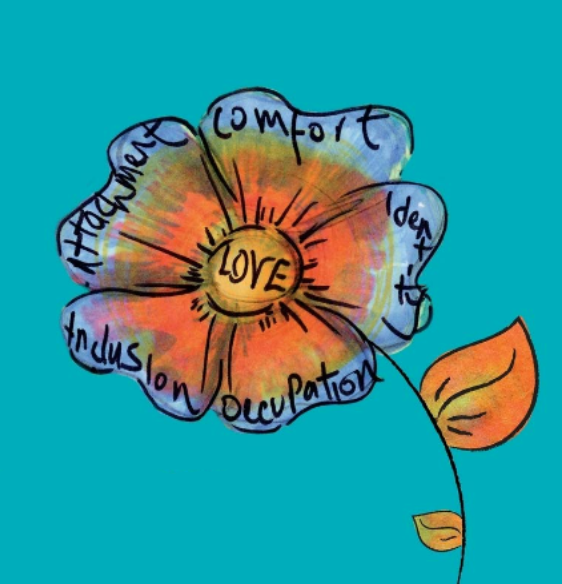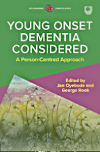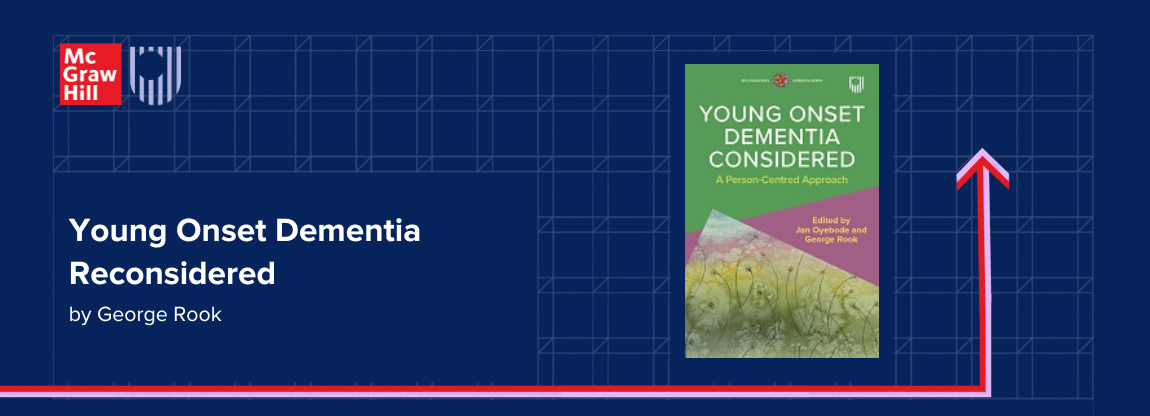Young Onset Dementia Reconsidered
A new book co-edited by Jan Oyebode and George Rook, and one of a series entitled Dementia Reconsidered, published by McGraw Hill and Open University Press.
It is now thirty years since Tom Kitwood published his books about person-centered approaches to Dementia, with which many are now familiar. See the person, not the disease, is now a familiar phrase, and there has been a growing movement promoting the idea (and practicality) of living as well as you can with dementia, as opposed to the traditional fear of a terminal, incurable disease.


It is time to revisit Kitwood’s ideas, not least because in these years of austerity the availability of support for those living with dementia is declining. Secondly, the hyper-promoted wonder drugs that will provide a ‘cure’ can be seen just over the horizon, and people living with dementia are in danger of once again being over medicalized, as I see it, from individual human beings into subjects for infusions and scans (and money making).
Before we started gathering chapters for the book Jan and I held three online meetings with people living with young onset dementia, facilitated through the DEEP network, each meeting having a theme: identity, control, and social connection. These three themes had emerged from the Angela project and seemed to be good starting points for a new book about Young Onset Dementia.
Young Onset Dementia is still poorly recognised by health professionals, and it takes four or more years to get a diagnosis, after depression and stress (and of course other organic diseases) have been ruled out. It’s worth noting, of course, that up to 40% of those living with dementia actually also have depression; make of that what you want.
Our early chapters deal with diagnosis, including how diagnosis is given to people. Language and emotional intelligence have to be tailored so that the shock of diagnosis is minimised. How much information should people receive at the time, how much later? What information? What next?
People who develop young onset dementia, that is in whom symptoms become noticeable before the age of 65, are likely to be in very different life situations than older people. In our book, chapter authors consider the challenging effects that young onset dementia can have, such as on family relationships and finances, self-regard or identity, social connection, and control.
There are chapters on legal and financial matters, as navigating the world of rights, benefits and legal issues is often very difficult. One of the most common experiences of those living with young onset dementia is of solicitors (and others?) assuming they lack capacity just because they have a diagnosis. Wrong!
A chapter examines cultural issues and the impact of dementia upon minority groups, based on Indigenous people in Canada. Do ethnic minorities get equity of access to diagnosis and support? Do prejudicial attitudes adversely affect their lives? What can we learn and therefore change?
Family or friend carers (oh my, what should we call them?), have a chapter to themselves, of course. Young onset dementia can be pretty devastating to a family and to a partner/spouse, but our authors throughout the book do come up with many potential solutions or sources of support.
Occupation and employment, not necessarily the same thing, are dealt with. Occupation is usually closely interlinked to a sense of identity and purpose, and the sudden loss of a paid job is often keenly felt as a loss of self-worth. Employers are too often reluctant (or what could be seen as ignorant of their responsibility) to make adjustments that allow a person to continue working after diagnosis.
A diagnosis of dementia is too often seen, by those affected and by those who look on, as a terminal death sentence, and that the person diagnosed is thereafter incapable. Indeed, in the UK recently there has been a campaign that sought to portray life with dementia as a series of deaths, “again and again and again”, as each cognitive faculty slips away. This is far from the truth and is supremely unkind. It is also of course factually untrue. Several chapters in this book emphasise and explain how people can and should continue to live as well as they can, to find activity, social connection, and purpose in their lives.
Our chapter authors offer advice and practical steps you can take to find ways round difficulties that present themselves. There is a chapter on cognitive rehabilitation, an evidence-based approach to enabling people with dementia to find ways of doing things that matter to them and another on using technology to support independence.
We have a chapter on the rare dementias, including Fronto Temporal Dementia, Dementia with Lewy Bodies, and Young Onset Alzheimer’s Disease, which account for about 15% of total cases of dementia.
We hope our book will be an opportunity to refocus professional minds and approaches to young onset dementia and provide solution-based approaches to the challenges of the disease. It is very much also for lay people who are affected in some way by young onset dementia, and for the more academic readers who will find an encyclopaedia of ideas and references for further work.
The full series of books under the Reconsidering Dementia Series launched in 2022 under the Series Editors Professor Dawn Brooker and Keith Oliver.
George Rook has worked as an accountant, English teacher and school business manager. He was diagnosed with young onset dementia aged 62, and has since then been increasingly involved in activism, speaking and blogging about living with dementia. He is now also engaged in research projects. George learned to paint during Covid and gets huge satisfaction from it.
George Rook, Co-Editor


Young Onset Dementia Reconsidered

